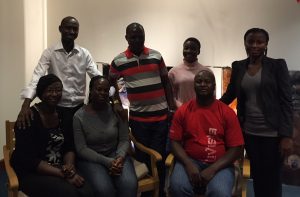 The University of Rhode Island Coastal Resources Center (URI CRC) is proudly hosting seven graduate students from Africa, with affiliations at several colleges, who are, with CRC guidance, pursuing URI master’s and doctoral degrees in varied fields to ultimately help build the capacity of their own communities to engage in innovative coastal management planning and practice. CRC is engaged in extensive coastal management and fisheries related projects in the countries of Ghana and Malawi; bolstering the professional development of emerging leaders and in-country practitioners is a critical aspect of the work — a focus emphasized by URI President David M. Dooley at his recent meeting with University of Cape Coast/Ghana (UCC) leadership to initiate a learning exchange between the schools. Funding for the graduate student effort is provided by the U.S. Agency for International Development (USAID). While one student, Evans Arizi of Ghana, is already well underway with his URI study program, six more are embarking this semester. From Ghana: Rosina Cobbina, Ivy Gyimah, Vida Osei and Evelyn Takyi. From Malawi: Innocent Gumulira and Elliot Lungu. Please join CRC in extending a warm welcome to this student group.
The University of Rhode Island Coastal Resources Center (URI CRC) is proudly hosting seven graduate students from Africa, with affiliations at several colleges, who are, with CRC guidance, pursuing URI master’s and doctoral degrees in varied fields to ultimately help build the capacity of their own communities to engage in innovative coastal management planning and practice. CRC is engaged in extensive coastal management and fisheries related projects in the countries of Ghana and Malawi; bolstering the professional development of emerging leaders and in-country practitioners is a critical aspect of the work — a focus emphasized by URI President David M. Dooley at his recent meeting with University of Cape Coast/Ghana (UCC) leadership to initiate a learning exchange between the schools. Funding for the graduate student effort is provided by the U.S. Agency for International Development (USAID). While one student, Evans Arizi of Ghana, is already well underway with his URI study program, six more are embarking this semester. From Ghana: Rosina Cobbina, Ivy Gyimah, Vida Osei and Evelyn Takyi. From Malawi: Innocent Gumulira and Elliot Lungu. Please join CRC in extending a warm welcome to this student group.
Tag Archives: UCC
Hundreds Attend President Dooley’s Lecture in Ghana
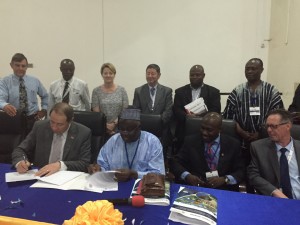
Hundreds of people attended Friday’s public lecture by URI President David M. Dooley at the University of Cape Coast (UCC) in Ghana and later witnessed the signing of a memorandum of understanding between CRC/URI and UCC’s Department of Fisheries and Aquatic Sciences and Centre for Coastal Management, during the president’s first trip to the West African nation.
During his talk, President Dooley said his vision upon assuming office as president of URI was to vastly increase internationalization and globalization of the school and its students because the world we live in is not just interconnected but interdependent and hyper-connected. Such hyper-connectedness includes a global economy and society in which citizens communicate in seconds and not in days or weeks. The complexity of the modern world includes great challenges, such as climate change, which is beyond one single nation’s ability to solve alone, he continued.
“With these global challenges also come global opportunities. We need to focus more on the opportunities,” he told the audience.
He continued: The less-developed world is not responsible for the lion’s share of atmospheric changes, but it and the entire world have to live with the consequence. That is not the only challenge with global consequences: War in one country affects the entire world; the outbreak of diseases, quality of the air we breathe, sustainability of the food supply, disputes and conflicts are all global issues, he said.
“We are no longer insulated by borders and oceans as we once were, but in all this, are global opportunities and demand for higher education,” President Dooley said.
During the memorandum of understanding signing ceremony, President Dooley received a gift of rich local Ghanaian kente cloth and sandals. The entire URI delegation received souvenirs from UCC as a symbol of friendship.
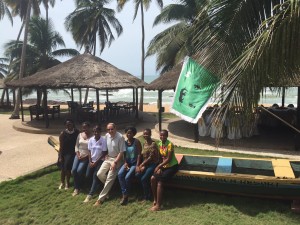
President Dooley continued his inaugural trip to Ghana Saturday when he met with four doctoral and two master’s students bound for URI on a USAID-funded scholarship program. The graduate students went through an intensive and competitive selection process to emerge as recipients of the scholarships. President Dooley congratulated and welcomed the students in advance to URI and hoped they make the most of the experience.
Two USAID projects, USAID/Ghana Sustainable Fisheries Management Project (SFMP) and USAID/UCC Capacity Strengthening Project are collaborating in this effort.
Also Saturday, two research assistants from UCC supporting SFMP’s research and improved data quality systems activities demonstrated how they collect fish stock data.
President Dooley Begins Ghana Trip with Visit to UCC
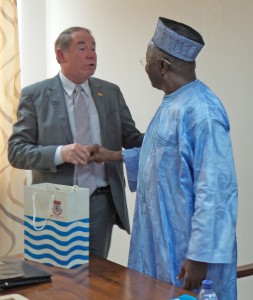
URI President Dr. David M. Dooley is in Ghana through April 20, solidifying relationships with Ghanaian universities and visiting projects led by CRC: USAID/Ghana Sustainable Fisheries Management Project (SFMP) and USAID/West Africa Analytical Support Services and Evaluations for Sustainable Systems (ASSESS).
On Friday, April, 15, he met with University of Cape Coast (UCC) Vice-Chancellor Professor D.D. Kuupole. President Dooley said he sees his visit as an opportunity to strengthen collaboration and friendship with the wider university community. Prof. Kuupole says UCC treasures the collaboration, which has helped draw the university’s Department of Fisheries and Aquatic Sciences into the limelight.
CRC Gives Grad Student from Ghana Opportunity to Make a Difference
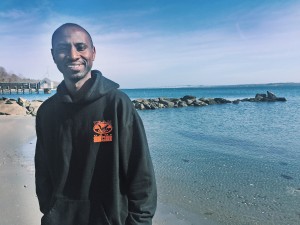
As a young boy growing up in a coastal village in Ghana, URI graduate student Evans Arizi could see the economic importance of fish.
He saw local fishermen in Metika and Anlomatuope — fishing villages near the border of Ghana and Cote d’Ivoire in West Africa — paddle their canoes into the waves and watched international boats cast nets into the water to reel in Ghana’s main source of protein.
He also saw how frequently fishing resources were exploited.
“The challenges are many,” Arizi, 29, says. “Some fishermen are using inadvisable methods of fishing, and the territorial waters are not protected due to insufficient logistics, so anyone can come in there and fish.”
In Ghana, lack of government investment in sustainable fishing policies has created a plethora of problems with illegal fishing. Because fishing laws are not properly enforced, vessels frequently use incorrect gear, like nets that are too small to free bycatches and immature fish, therefore increasing their catch and profits but depleting the stock of young fish before they can reproduce. Though fishermen are supposed to report juvenile catches, many do not out of fear of punishment. Arizi says local fishermen sometimes adhere to practices that pollute waters and lead to species degradation.
“Local authorities back these illegal practices out of greed,” he says. “(They think,) ‘Let me think of my stomach, let me not think of others.’ ”
Arizi aims to help change that culture at home, and the path to that goal has taken him to URI. He was introduced to the university through CRC. As an undergraduate, he participated in a fish stock assessment training program that was part of a CRC sustainable fisheries project in Ghana, which “provided many useful relevant materials” to local fishing communities, he says.
CRC currently leads a group of partners in the five-year Sustainable Fisheries Management Project in Ghana funded by the United States Agency for International Development (USAID/Ghana SFMP). The project aims to improve conditions for sustainable local fishing practices, help fishing communities become stewards of their resources, strengthen information systems for managing fisheries and increase awareness for protecting fisheries ecosystems and the people who rely on them for their livelihoods, among other goals.
To help create the next generation of fisheries scientists and leaders in Ghana, the project is facilitating student exchanges and scholarship opportunities at URI in collaboration with the University of Cape Coast in Ghana, Arizi’s alma mater. Through CRC, Arizi applied for a scholarship to earn a PhD in Biological and Environmental Sciences at URI. He was accepted and moved to URI to begin the three-and-a-half-year program in January. It was his first time outside of Ghana.
“When the opportunity came for me to come here I was so excited,” Arizi says. “I felt that by coming here I would get the necessary materials and resources to be equipped to handle the opposition (to implementing and enforcing sustainable fishing laws in Ghana).”
Before coming to URI, Arizi worked as a principal research assistant for the Department of Fisheries & Aquatic Sciences at the University of Cape Coast in Ghana. That experience, his fieldwork with CRC and his course work as an undergrad and graduate student at the university in Ghana brought the fisheries challenges into sharp focus. Much of it comes down to competition, Arizi says.
“When an individual spots a friend doing such an unwarranted act (like illegal fishing practices), he will decide to do the same,” Arizi says. While he believes the government needs to implement and enforce fishing laws recommended to them by many — including SFMP, which helped the country draft the recently adopted National Fisheries Management Plan — the most important change needed is in the behavior of fishermen.
“The fishermen have to change their behavior and also put their trust in others, he says.
Arizi hopes that his wife, whom he married a month before moving to Rhode Island, eventually can join him. Currently, however, his main focus is his studies. “I don’t want to get any Cs, not at all, so I have to work hard,” Arizi says. “My wife keeps on encouraging me to do well.” He is the first member of his family to go to college; however, he hopes his six siblings can follow his lead.
Though Arizi says that working to excel in his five classes often means waking up early in the morning and staying up late at night, he likes graduate school.
“God has done a lot for me, because of all my friends who started out in school at the same time, I’m the only one who made it to this level,” Arizi says. “I like education; knowledge is power.”
— Allison Farrelly
Ghana University Leaders Visit URI
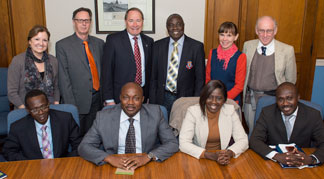
Scholars from the University of Cape Coast in Ghana won the hearts—and hats—of URI professors during a visit this week to strengthen an academic collaboration between the two institutions. The five-day visit was part of a $24 million sustainable fisheries project led by CRC. Read more.
Ghana University Officials to Visit URI As Part of $24 Million Sustainable Fisheries Project

A delegation from the University of Cape Coast in Ghana will visit the University of Rhode Island next week as part of a $24 million sustainable fisheries project led by the Coastal Resources Center (CRC) at URI’s Graduate School of Oceanography.
The Ghana delegation will meet with URI President David M. Dooley Jan. 27 to expand on a memorandum of understanding that the universities signed in May 2015.
The agreement includes opportunities for cooperative research as well as faculty and student exchanges in Ghana and at URI. The West African university has a longstanding partnership with URI through CRC-led coastal management and food security projects in Ghana. Currently, CRC is leading the implementation of the five-year, $24 million United States Agency for International Development Ghana Sustainable Fisheries Management Project. The USAID grant is the largest ever awarded to URI.
Two fisheries experts from URI’s coastal center, Brian Crawford, in-country project director, and Najih Lazar, senior fisheries advisor, have been living in Ghana for the past year to help lead the project. Its goal is to revitalize marine fisheries stocks through responsible fishing practices and improved governance and ultimately benefit the more than 100,000 women and men involved in the Ghana fishing industry.
As part of this project, CRC and URI are working to build the research, educational and outreach capacity of the University of Cape Coast in coastal and fisheries management.
“Collaboration with the University of Cape Coast is an important element of the project, as one of the critical objectives of it is to build the skills and knowledge of Ghanaian stakeholders so they can continue the vital work of sustaining their fisheries sector and coastal communities long after this URI-led project has ended,” said Donald Robadue, sustainable fisheries project manager at CRC.
Leaders from both universities will discuss several aspects of the collaboration, with particular emphasis on student and faculty exchanges. These include developing an undergraduate program for URI students in Ghana during J Term, identifying areas of joint research among faculty, exploring opportunities for professional development and examining other areas of potential cooperation in marine fisheries, aquaculture and coastal resources.
The University of Cape Coast delegation also will visit URI’s Narragansett Bay Campus to meet with Graduate School of Oceanography Dean Bruce Corliss and talk with CRC colleagues about the details of the ongoing collaboration.
University Partner in Ghana Awarded USAID Capacity Development Grant
The United States Agency for International Development (USAID), a frequent funding partner of CRC, officially committed $5.5 million dollars to the University of Cape Coast (UCC) in Ghana for a five-year program in fisheries and coastal management capacity development. Last month two UCC officials visited CRC and URI to explore how best to implement such a program. The visit was arranged as part of the CRC-led, USAID-funded Sustainable Fisheries Management Project (SFMP) in Ghana. One of the objectives of that five-year, $24-million project is to strengthen UCC’s fisheries and coastal management department by hosting at URI up to 10 masters and doctoral students from UCC, sponsoring other student and faculty exchanges, conducting joint research and holding a fisheries leadership course in Ghana that draws on URI’s experiences.
This new USAID award will fund the creation of a coastal management center at UCC. You can read the the local Ghanaian media reports here:
http://vibeghana.com/2015/02/01/ucc-usaid-to-improve-fisheries-coastal-management-in-ghana/
http://news.peacefmonline.com/pages/social/201502/230872.php
Ghanaian Fisheries Experts Visit URI to Study Outreach Models
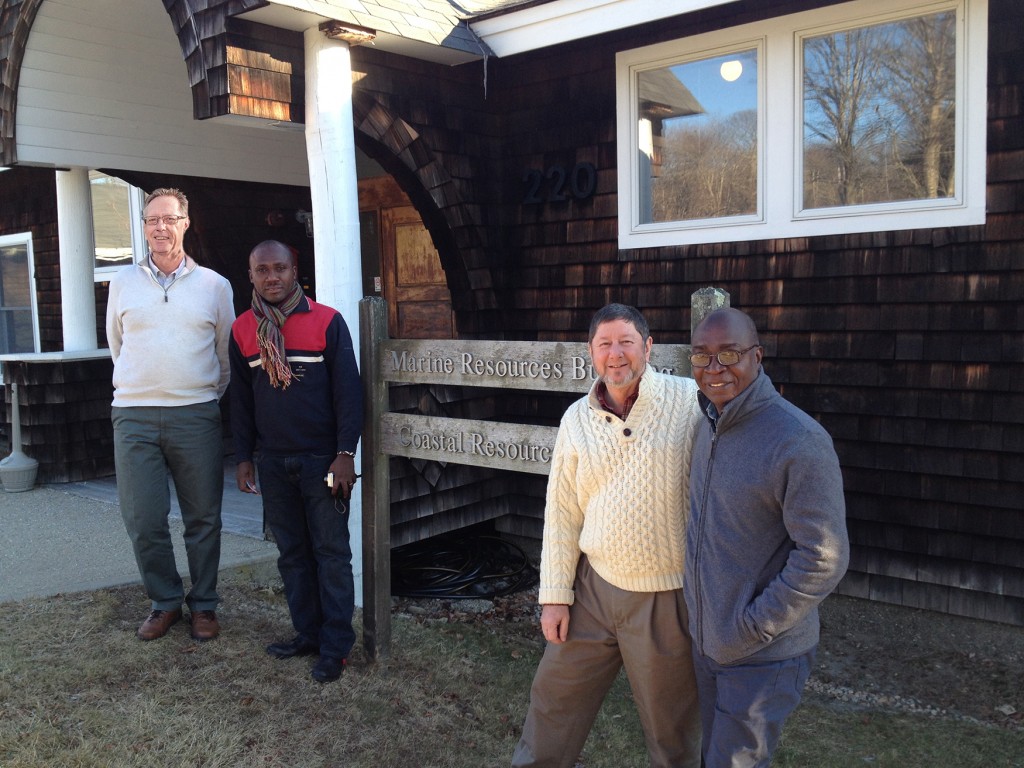
Fisheries experts Dr. Denis Worlanyo Aheto and Dr. John Blay of the University of Cape Coast (UCC) in Ghana braved the snow and cold to travel to URI in early January to study models of integrated coastal management and outreach programs and to foster research cooperation and learning opportunities for students at both universities.
“Our primary objective is to look at the various models for how universities can support capacity building in fisheries and coastal management,” said Aheto, head of the department of Fisheries and Aquatic Sciences at UCC and project manager at UCC’s new Centre for Coastal Management, funded by the United States Agency for International Development (USAID). Fisheries capacity building, research and extension are at the core of the center’s mission, said Blay, UCC fisheries professor and coordinator of the new center, and URI and Rhode Island are leaders in those areas.
The Coastal Resources Center (CRC) at URI’s Graduate School of Oceanography hosted the men for a week as part of CRC’s USAID/Ghana Sustainable Management Fisheries Project (SFMP). Aheto and Blay held discussions with faculty and top administrators across URI, met with members of the Commercial Fisheries Research Foundation and Save the Bay, visited National Oceanic and Atmospheric Administration and Department of Environmental Management offices and learned about Rhode Island Sea Grant’s extension and outreach work. “The Sea Grant model is fantastic,” Blay said.
“The role of the state is very strong in driving research in fisheries (in Rhode Island),” Aheto observed. “We would like to adapt this to the situation in coastal Ghana.” They said the URI and Sea Grant experiences have provided them with a framework for addressing the challenge of bringing the government of Ghana on board in terms of commitment and funding for fisheries and coastal management and overcoming the lack of connection among organizations. “That is really the issue (in Ghana), the need to establish a strong connection. There is too large a gulf between the university, the government and the fishermen,” Aheto said.
“The Commercial Fisherman’s Research Foundation is very interesting” in its strong connections to URI and fisheries research, Blay said. “In Ghana the fishermen are not seeing the university as a resource.” That lack of integration translates to a lack of support for university research, the men say, and they want to change that.
Aheto said Rhode Island and Ghana do share similarities when it comes to fisheries and coastal management. “We have the building blocks of a good system in place. We have UCC; we have a ministry of fisheries; we have fishermen’s organizations. The structure is in place, the problem is to bring up the capacity of the people in these institutions.”
Developing that capacity is where the role of URI is particularly important. One of the goals of the five-year SFMP initiative is to strengthen UCC’s fisheries and coastal management department by hosting up to 10 masters and doctoral students from UCC at URI, sponsoring other student and faculty exchanges, conducting joint research and holding a fisheries leadership course in Ghana that draws on URI’s experiences.
Such capacity building already is underway. Next month UCC students begin SFMP fieldwork in two estuary areas in Ghana, said Najih Lazar who is transitioning from the URI Fisheries Center to join SFMP in Ghana as fisheries advisor. “We will focus on applied research, working directly with two communities. UCC students will collect data from fishermen and exchange information with them,” explained Lazar.
Back in Ghana, Blay and Aheto will share what they have learned with their colleagues and counterparts in the government and make their case for outreach and integration. “We are going to make ourselves relevant through discussions with government and fishers and get the dialogue going,” Blay said.
UCC’s Center for Coastal Management already is gaining momentum, they said. The fisheries and coastal management department has bought three vehicles that will allow its 50 undergraduates and 20 graduate students access to field sites for research, and laboratories are getting new equipment and renovation. “We are like new kids on the block. There is much to be excited about,” Aheto said.


